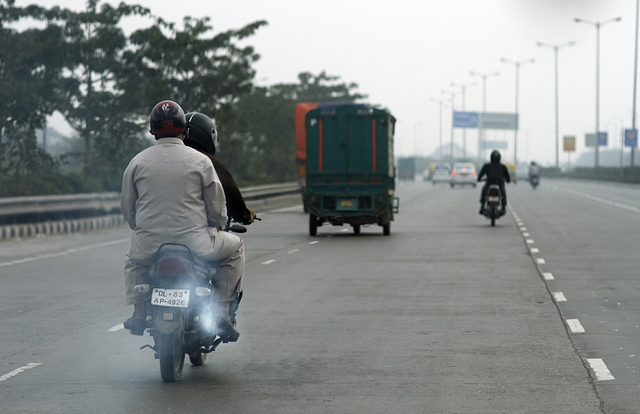
Seeking To Curb Pollution, Centre Advances BS-VI Fuel By Two Years For Delhi
The Centre today (15 November) advanced the introduction of ultra-clean Euro-VI grade petrol and diesel in the national capital of Delhi by two years to April 2018 to help fight air pollution that has reached alarming levels.
In 2015, India decided to leapfrog straight to Euro-VI compliant petrol and diesel from the current Euro-IV grade, which was to be rolled out in April 2020.
While the deadline for the rest of the country stands, Delhi, which is among the most polluted cities in the world, will see the deadline for introduction of Bharat Stage-VI – equivalent to Euro-VI grade, advanced to April 2018, the Ministry of Petroleum and Natural Gas (MoP&NG) said in a statement.
Several new refineries are already capable of producing Euro-VI grade fuel, which contain 10 parts per million (ppm) of sulphur as against 50 ppm in Euro-IV fuels.
Delhi consumed 906,000 tons of petrol and 1.26 million tonnes of diesel in 2016-17 and meeting that requirement from April next year would not be a problem.
"Taking into account the serious pollution levels in Delhi and adjoining areas, Petroleum Ministry in consultation with public sector oil marketing companies has decided for preponement of BS-VI grade auto fuels in national capital territory of Delhi with effect from 1 April, 2018 instead of 1 April, 2020," it said.
Fuel retailers have also been asked to examine the possibility of introduction of BS-VI auto fuels in the whole of national capital regions, which also includes adjoining cities of Ghaziabad, Noida, Gurugram and Faridabad, from 1 April, 2019.
The introduction of Euro-VI grade fuel is expected to help mitigate the problem of air pollution in the NCT of Delhi and surrounding areas, the statement said.
Fuel meeting BS-IV or Euro-IV emission norm was introduced across the country from 1 April, 2017.
"Migration to BS-IV grade fuels shows India’s resolve to cut down emissions," the statement said. "As a next step in this direction, the Government in consultation with stakeholders has decided to meet international best practices by leapfrogging directly from BS-IV to BS-VI grade by 1 April, 2020, skipping BS-V altogether."
Oil refineries will need to invest Rs 80,000 crore in upgrading petrol and diesel quality to meet cleaner fuel specifications by 2020.
According to Indian Oil Corp (IOC), for petrol engines, one of the most critical specification is Research Octane No. (RON), which has improved from 88 in BS-II to 91, which is at par with regular 91 octane gasoline (petrol) required for Euro VI emission norms.
Sulphur specification for petrol and diesel will be reduced 50 times for a level of 500 ppm for BS-II fuel to 10 ppm in BS-VI.
Oil refineries had previously upgraded technology and invested over Rs 55,000 crore for production and supply of BS- III/IV fuels. PTI